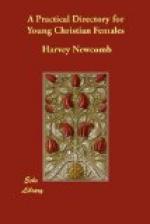IX. Charity rejoiceth not in iniquity, but rejoiceth in the truth. One mark by which the people of God are known is, that they “sigh and cry over the abominations that are done in the land,” and weep rivers of water because men keep not the law of God; while the wicked “rejoice to do evil, and delight in the frowardness of the wicked.” But we may deceive ourselves, and be indulging a morbid appetite for fault-finding and slander, while we suppose ourselves to be grieving over the sins of others. Grief is a tender emotion. It melts the heart, and sheds around it a hallowed influence. Hence, if we find ourselves indulging a sharp, censorious spirit, eagerly catching up the faults of others, and dwelling on them, and magnifying them, and judging harshly of them, we may be sure we have another mark, which belongs not to the fold of the Good Shepherd. One of the prominent characteristics of an impenitent heart is a disposition to feed upon the faults of professors of religion. Those who indulge this disposition will not admit that they take delight in the failings of Christians. They will condemn them with great severity, and lament over the dishonor they bring upon religion. Yet they catch at the deficiencies of Christians as eagerly as ever a hungry spaniel caught after his meat. This is the whole of their spiritual meat and drink. It is the foundation of their hopes. They rest their claim for admittance into the celestial paradise on being quite as consistent in their conduct as those who profess to be God’s people; hence, every deficiency they discover gives them a new plea to urge at the portals of heaven. Thus they secretly, though perhaps unwittingly, “rejoice in iniquity.” But it is to be feared, if we may judge from the exhibition of the same spirit, that many who make high pretensions to superior sanctity rest their hopes, to a great extent, on a similar foundation. With the Pharisaical Jews, they think if they judge them that do evil, even though they do the same, they shall escape the judgment of God. They are as eager to catch up and proclaim upon the house-top the deficiencies of their brethren, as the self-righteous moralist, who prides himself on making no profession, and yet being as consistent as those that do. If such persons




